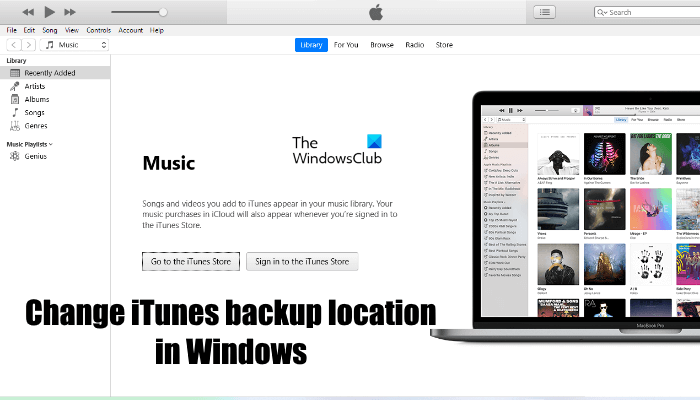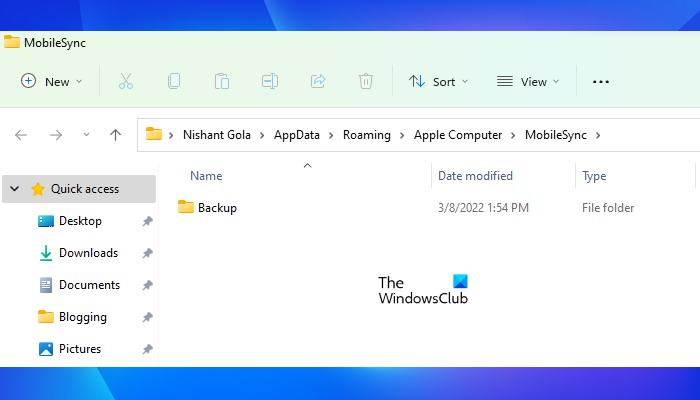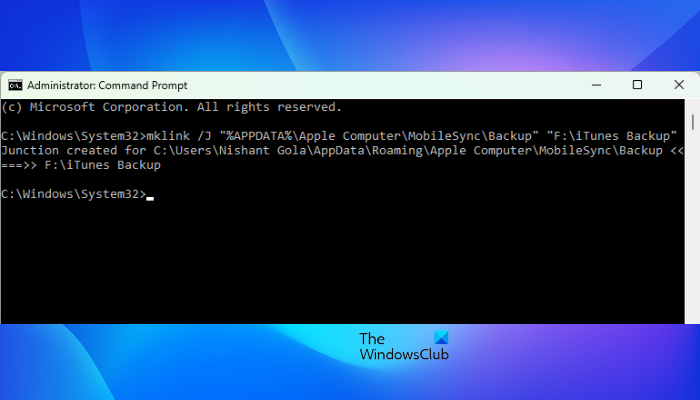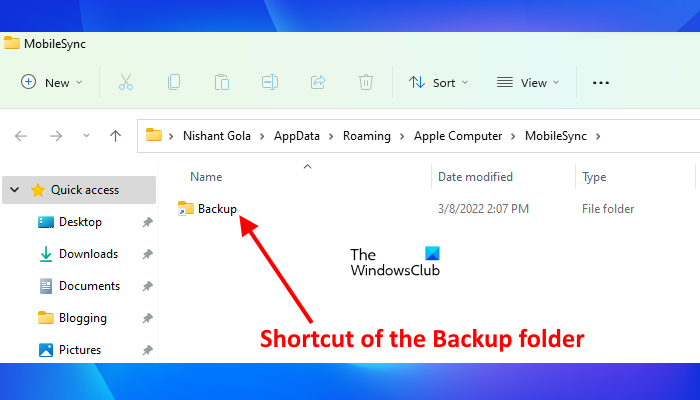iTunes is a program developed by Apple that you can use to play and manage your media files on Apple devices. iTunes is also available for Windows devices. You can install it either from the Microsoft Store as an app or download its installer file from Apple’s official website to install it as software. The default installation location of iTunes is the C drive. When you sync iTunes on your iPhone to iTunes on your Windows PC, a MobileSync folder is created automatically in your C directory that contains a Backup folder. The Backup folder is used to store iTunes backup. Therefore, its size increases with time. Hence, it is a good idea to change its location from the C drive to another drive. In this article, we will explain how to change iTunes backup location in Windows 11/10.

How to change iTunes backup location in Windows 11/10
The following steps will help you change the iTunes backup location in Windows 11/10:
- Open the MobileSync folder on your Windows 11/10 device.
- Move the Backup folder to another directory.
- Launch an elevated Command Prompt.
- Run a command to create a Symbolic Link between the old backup location and the new backup location.
- Exit the Command Prompt.
From the above steps, it is clear that you have to create a Symbolic Link between the old backup location and the new one. In computing, a Symbolic Link or Symlink is used to point a file or folder in one location to the file or folder in another location. The Symlink for a particular file or folder looks like a shortcut for the users but it is not just a shortcut.
Let’s see how to change iTunes backup location in Windows 11/10 by creating a Symlink.
1] Open the MobileSync folder on your Windows 11/10 device. The location of the MobileSync folder is different for iTunes for Windows PC that you have downloaded from Apple’s website and the iTunes app that you have installed from the Microsoft Store.

Open the Run command box by pressing the Win + R keys and enter the following commands based on the type of iTunes program you have installed on your device.
- For iTunes for Windows PC: %APPDATA%\Apple Computer\MobileSync
- For iTunes app from Microsoft Store: %USERPROFILE%\Apple\MobileSync
After entering the above commands in the Run Command box, click OK. Windows will open the MobileSync folder in File Explorer.
2] You will see the Backup folder inside the MobileSync folder. Now, you have to move this folder to another location. I have created a folder with the name iTunes Backup on my hard disk partition New Volume F. I have moved the Backup folder inside this folder. You can move the Backup folder to any directory on your computer.
3] Now, launch an elevated Command Prompt in order to create a Symlink for the Backup folder.
4] Copy the following command and paste it into the elevated Command prompt. After that hit Enter.

For iTunes for Windows PC:
mklink /J “%APPDATA%\Apple Computer\MobileSync\Backup” “F:\iTunes Backup”
For iTunes app from the Microsoft Store:
mklink /J “%USERPROFILE%\Apple\MobileSync\Backup” “F:\iTunes Backup”
Do note that, in the above two commands, I have used the string F:\iTunes Backup because I have moved the Backup folder from the C drive to the iTunes Backup folder on my F drive. Hence, iTunes Backup is my target folder. Similarly, you have to replace the F:\iTunes Backup string with your target folder location. For example, if you have moved the Backup folder from the C drive to your G drive inside a folder, say, New iTunes Backup folder, then the above commands will look like this:
For iTunes for Windows PC:
mklink /J “%APPDATA%\Apple Computer\MobileSync\Backup” “G:\New iTunes Backup folder”
For iTunes app from the Microsoft Store:
mklink /J “%USERPROFILE%\Apple\MobileSync\Backup” “G:\New iTunes Backup folder”
After typing the above commands, press Enter. The above commands will create a Symbolic Link between the old iTunes backup location and the new iTunes backup location.

After the execution of the above commands, you will see that a shortcut Backup folder is created inside the MobileSync folder on your C drive. Now, type exit in the Command Prompt and hit Enter. This will close the Command Prompt window.
Your iTunes backup location has been changed.
Read: iTunes has detected a problem with your audio configuration
How do I change iTunes backup location?
By default, the MobileSync folder on the C drive is the iTunes backup location on Windows devices. If you want to change this default backup location, first, you have to move the backup folder from the C directory to another location and then create a Symbolic Link between the old backup location and the new backup location.
After creating a Symbolic Link, you will see that Windows has created a shortcut folder with the name Backup inside the MobileSync folder (the old backup location for iTunes). This shortcut folder points to the new backup location for iTunes.
Where are iPhone backups stored on Windows 11?
You will find iPhone backups inside the MobileSync folder on your Windows 11 computer. By default, the MobileSync folder is located on your C drive. The complete path of the MobileSync folder is as follows:
%APPDATA%\Apple Computer\MobileSync
If you do not find your iPhone backups on the above path, navigate to the following path:
%USERPROFILE%\Apple\MobileSync
This is all about how to change iTunes backup location in Windows 11/10.
Does iTunes still exist in 2022?
From what we have gathered, Apple has phased out iTunes for macOS devices, but the program, for now, is still available and fully supported on Windows 11/10 devices. As of right now, we do not know if Apple is planning to remove iTunes for Windows in the near or distant future.
Is iTunes available via the Microsoft Store?
Yes, Apple has made it possible for Windows 11/10 users to download the iTunes app from the Microsoft Store. So far, the ratings for the app are quite low, so you might want to just download the desktop version instead.
Is iTunes still used to back up iPhone?
As far as Windows 11/10 is concerned, iTunes is still the primary app for backing up content from your iPhone.
Read next: iTunes not working on Windows 11/10.
Leave a Reply